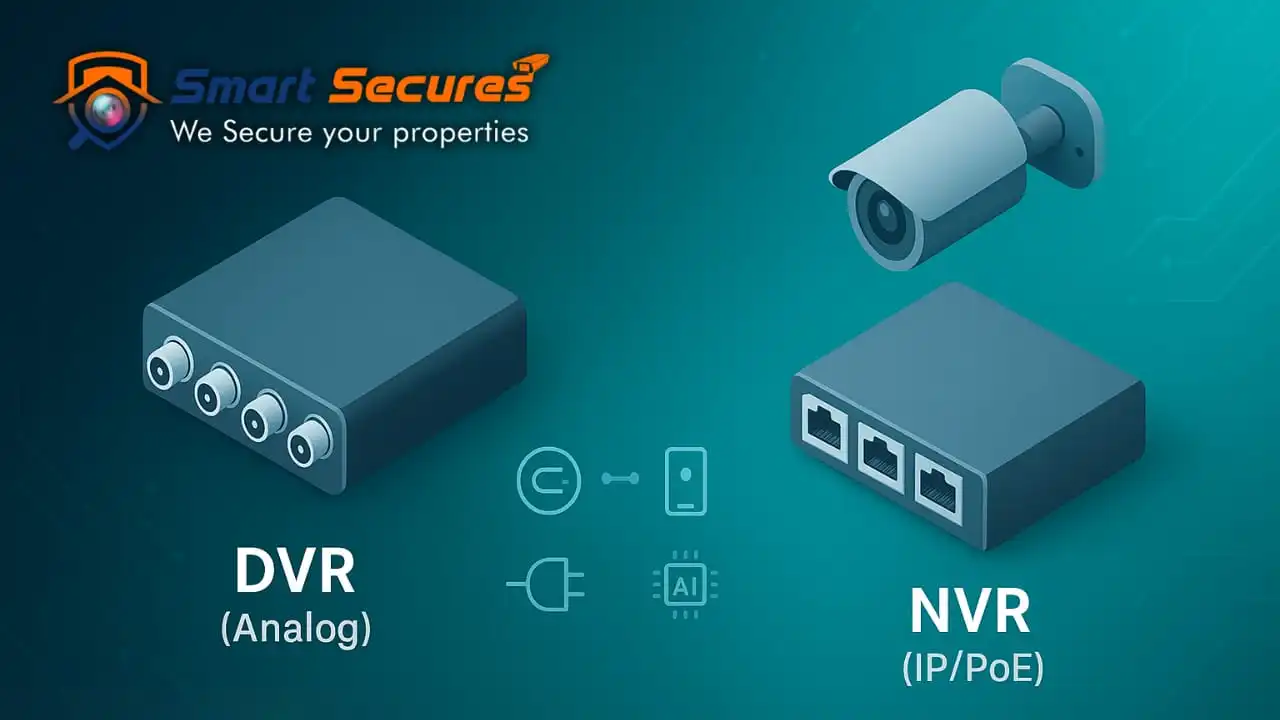When planning a CCTV security system, many people confuse DVR (Digital Video Recorder) with NVR (Network Video Recorder). These two systems may look similar because users use both to record and store surveillance footage. However, the way they work, the type of cameras they support, and their flexibility differ greatly.
This article explains the difference between DVR and NVR. It covers their pros and cons. It also helps you choose the right one for your home, office, or business.
What is a DVR (Digital Video Recorder)?
A DVR is a device used with analogue cameras. It captures the video feed from cameras through coaxial cables and then processes and stores the footage. The processing happens at the DVR itself, meaning the cameras only capture raw video.
Advantages of DVR:
- Cost-effective – Best for budget-conscious setups.
- Simple design – Works well with traditional analogue cameras.
- Reliable recording – Continuous recording without internet dependency.
Limitations of DVR:
- Lower resolution compared to IP systems.
- Requires more cabling (video, power, and audio separately).
- Limited remote access features.
- Less flexible when expanding the system.
What is NVR (Network Video Recorder)?
An NVR is designed to work with IP cameras. Unlike DVR, the processing happens at the camera level, and the recorder stores the processed footage. NVRs use Ethernet cables (PoE – Power over Ethernet) or Wi-Fi, which makes installation simpler and cleaner.
Advantages of NVR:
- High video quality – Supports HD, Full HD, and 4K resolutions.
- Easy installation – Single cable for both power and video (PoE).
- Remote Access – Seamless Mobile and Cloud Monitoring.
- Advanced features include motion detection, AI analytics, and face recognition.
- Scalable – Easy to add more cameras.
Limitations of NVR:
- More expensive compared to a DVR.
- Requires stable network connectivity.
- May need higher storage capacity for high-quality video.
DVR vs NVR: Technical Differences
| | DVR (Digital Video Recorder) |
|---|
| | NVR (Network Video Recorder) |
|---|
|
| | |
| | |
| Cabling | | | Ethernet (PoE) or Wireless |
|
| | |
| | | Supported over single cable |
|
| | | Easy, built-in remote viewing |
|
| Storage | | |
| | |
| | |
Use Cases: Where to Use DVR and NVR?
DVR Systems are best for:
- Small shops with limited budgets.
- Homes that already have analogue cameras installed.
- Locations with no stable internet.
NVR Systems are best for:
- Businesses, offices, and industries need high-resolution video.
- Smart homes that rely on remote monitoring.
- Schools, warehouses, and hospitals with larger security needs.
- Future-ready setups with AI and cloud features.
DVR vs NVR: Pros and Cons
DVR Pros:
- Low cost.
- Works with existing analogue setups.
- Suitable for basic surveillance.
DVR Cons:
- Lower video quality.
- Requires more cables.
- Limited features.
NVR Pros:
- Superior image clarity.
- Easy to install with PoE.
- Remote access from anywhere.
- Future-proof with AI features.
NVR Cons:
- Higher upfront cost.
- Depends on network reliability.
Which is Better: DVR or NVR?
If you are comparing DVR vs NVR, the answer depends on your needs:
- For basic, budget-friendly setups, go with a DVR.
- For modern, high-quality surveillance, choose NVR.
- For businesses and industries, NVR is a wise long-term investment.
Most users today prefer NVR systems because of the clarity, advanced features, and remote accessibility they provide.
Conclusion
The difference between DVR and NVR lies in the type of cameras they use, how they process data, and the features they offer. DVRs are affordable and reliable for basic setups, while NVRs offer advanced, high-resolution, and flexible solutions. When planning to install a CCTV camera, think about your budget and the size of your property. Also, consider how you might want to expand in the future. This will help you choose between DVR and NVR systems.

